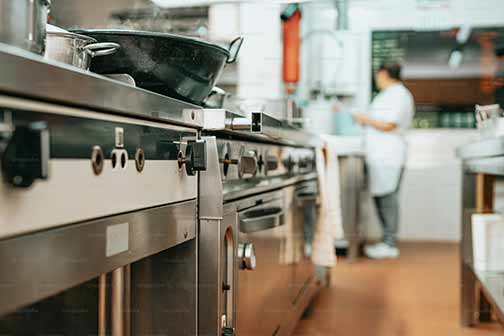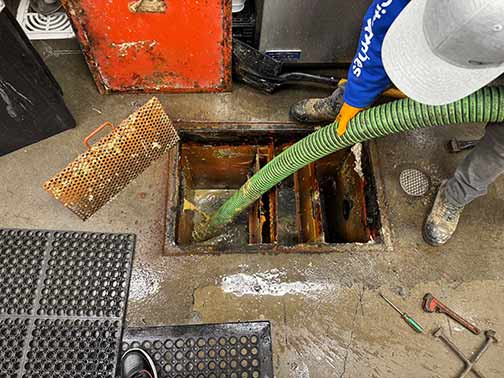
As the winter season approaches, Chicago restaurants face numerous challenges, one of which is maintaining their grease traps. Grease traps are crucial components of a restaurant’s plumbing system, designed to intercept fats, oils, and grease (FOG) before they enter the wastewater system. Regular maintenance of grease traps is essential, especially during the harsh winter months, to prevent costly and disruptive issues. Below we explore the importance of regular grease trap maintenance, the risks of neglect, and the benefits of proactive maintenance for ensuring smooth operations throughout the season.
The Importance of Regular Grease Trap Maintenance for Chicago Restaurants
Regular grease trap maintenance is vital for several reasons. Firstly, it ensures the efficient functioning of the trap, preventing FOG from entering the sewer system and causing blockages. Blockages can lead to unpleasant odors, slow drainage, and even complete plumbing failures, which can be particularly problematic during the busy winter season when restaurants experience higher customer volumes.
Secondly, regular maintenance helps to extend the lifespan of the grease trap. By keeping the trap clean and free from excessive buildup, restaurant owners can avoid costly repairs or replacements. Additionally, maintaining a clean grease trap is essential for compliance with local health and safety regulations, which often require regular inspections and maintenance records.
Lastly, regular maintenance helps to protect the environment. FOG that enters the sewer system can cause significant environmental damage, including water pollution and harm to aquatic life. By ensuring that grease traps are properly maintained, restaurants can play a crucial role in protecting the local ecosystem.
Risks of Neglecting Grease Trap Maintenance in the Harsh Chicago Winter
Neglecting grease trap maintenance can lead to a range of issues, many of which can be costly and disruptive. One of the most immediate risks is the development of blockages within the plumbing system. As FOG accumulates in the grease trap, it can solidify and create obstructions that prevent wastewater from flowing freely. This can result in slow drainage, unpleasant odors, and even sewage backups, which can be particularly troublesome during the winter months when pipes are more susceptible to freezing.
Another significant risk is the potential for health and safety violations. Local health departments often require restaurants to maintain and clean their grease traps and keep detailed records of maintenance activities. Failure to comply with these regulations can result in fines, penalties, and even temporary closure of the establishment. Moreover, a poorly maintained grease trap can create unsanitary conditions that may pose health risks to both employees and customers.
Neglecting grease trap maintenance can also have environmental consequences. When FOG enters the sewer system, it can contribute to the formation of fatbergs—large, solid masses of FOG and other debris that can block sewer lines. Fatbergs can cause significant damage to the sewer infrastructure and require costly and time-consuming removal efforts. Additionally, FOG that escapes into natural water bodies can lead to water pollution and harm aquatic life.
Benefits of Proactive Grease Trap Maintenance for Chicago Restaurants
Proactive grease trap maintenance offers numerous benefits for Chicago restaurants, particularly during the winter season. One of the primary advantages is the prevention of plumbing issues. By regularly cleaning out the grease trap, restaurant owners can avoid blockages, slow drainage, and sewage backups, ensuring that their plumbing systems function smoothly even during the busiest times.
Another benefit is cost savings. Regular maintenance helps to extend the lifespan of the grease trap, reducing the need for expensive repairs or replacements. Additionally, by avoiding plumbing emergencies and health code violations, restaurant owners can save money on fines, penalties, and potential loss of business due to temporary closures.
Proactive maintenance also contributes to a healthier and safer environment for both employees and customers. A clean and well-maintained grease trap helps to prevent unpleasant odors and unsanitary conditions, creating a more pleasant dining experience for customers and a safer working environment for staff.
Furthermore, proactive maintenance supports environmental sustainability. By preventing FOG from entering the sewer system, restaurants can help to reduce the risk of fatbergs and water pollution, contributing to the protection of the local ecosystem.

By regularly cleaning and maintaining the grease trap, restaurant owners can avoid blockages, slow drainage, and sewage backups, ensuring that their plumbing systems function smoothly even during the busiest times.
How to Implement a Regular Grease Trap Maintenance Schedule for Winter
Implementing a regular maintenance schedule for grease traps is essential for ensuring their proper functioning and longevity. The first step is to determine the appropriate frequency of cleaning based on the size of the grease trap, the volume of FOG produced, and local regulations. In general, most grease traps should be cleaned at least once every three months, but high-volume establishments may require more frequent maintenance.
Once the maintenance frequency is established, restaurant owners should create a detailed maintenance plan that includes the following steps:
- Regularly inspect the grease trap for signs of buildup and blockages.
- Schedule professional cleaning services to remove accumulated FOG and debris.
- Keep detailed records of all maintenance activities, including dates, services performed, and any issues identified.
- Train staff on the importance of grease trap maintenance and proper disposal of FOG.
- Implement best practices for reducing FOG production, such as scraping plates before washing and using strainers in sinks.
By following these steps, restaurant owners can ensure that their grease traps are properly maintained and functioning efficiently throughout the winter season.
Conclusion: Ensuring Smooth Operations Through Regular Grease Trap Maintenance
Regular grease trap maintenance is crucial for Chicago restaurants, especially during the winter months when plumbing systems are more vulnerable to issues. By understanding the importance of regular maintenance, recognizing the risks of neglect, and implementing a proactive maintenance schedule, restaurant owners can prevent costly and disruptive problems, ensure compliance with health and safety regulations, and contribute to environmental sustainability. Ultimately, investing in regular grease trap maintenance is essential for maintaining smooth operations and providing a safe and pleasant dining experience for customers.